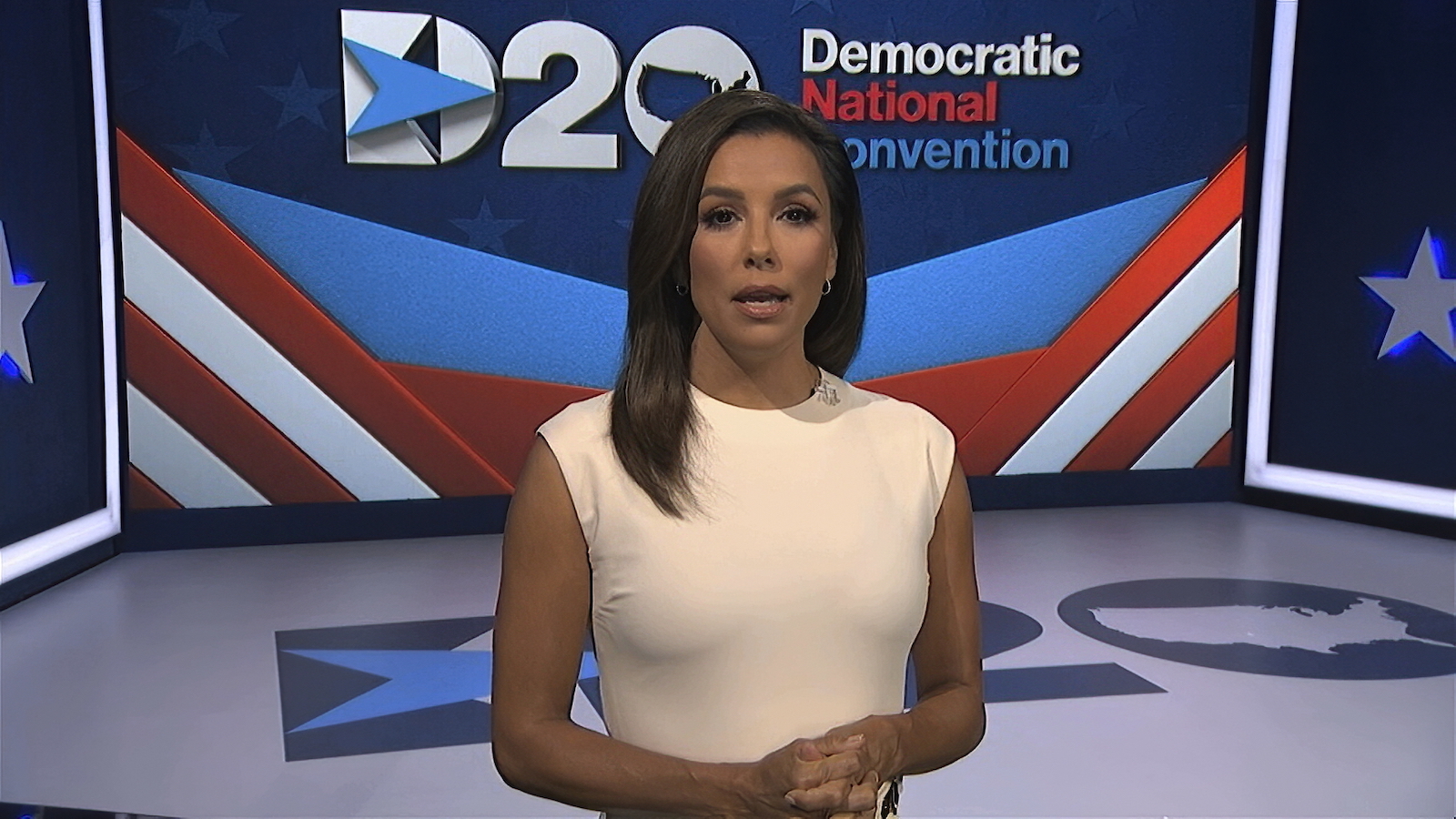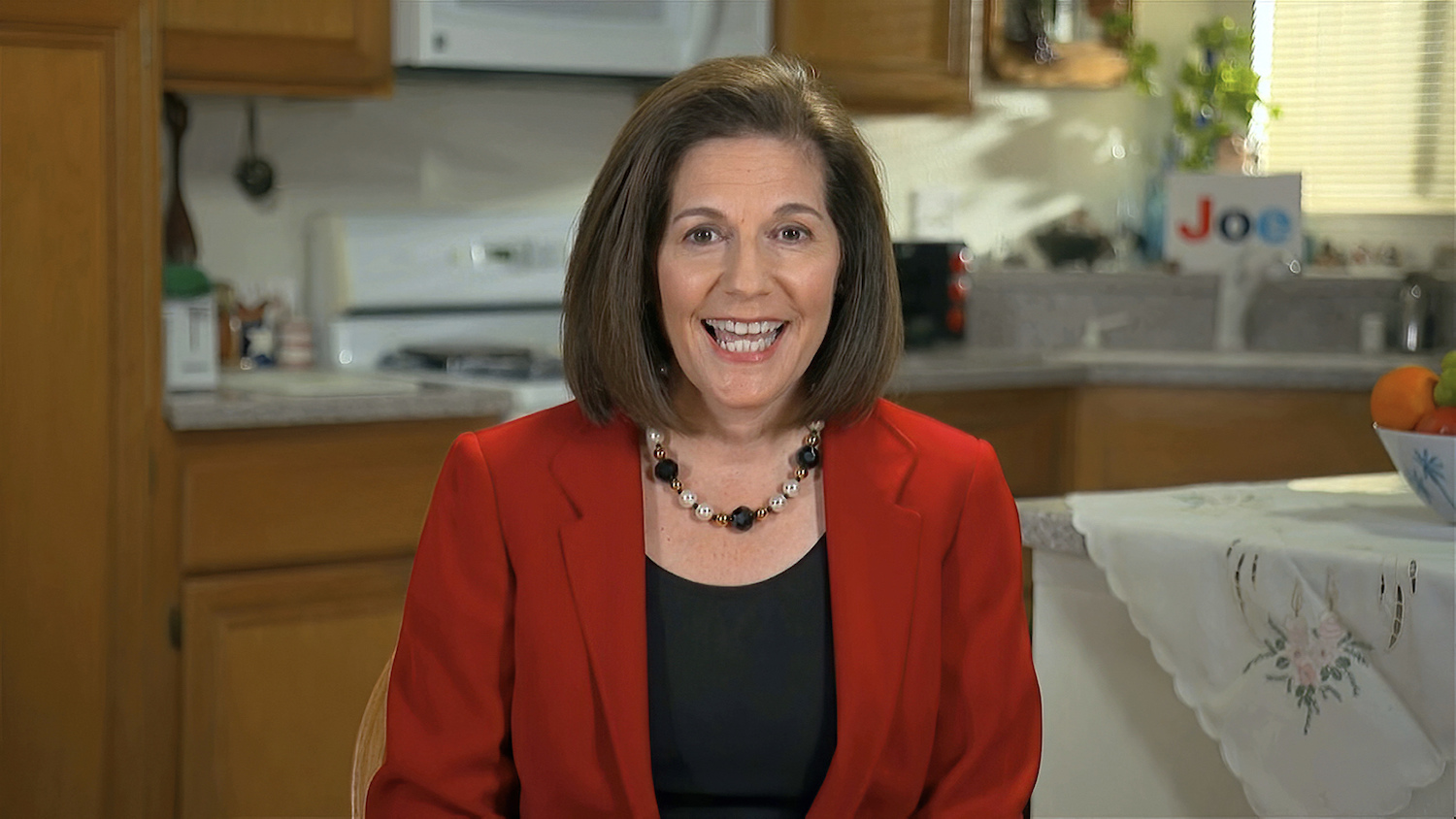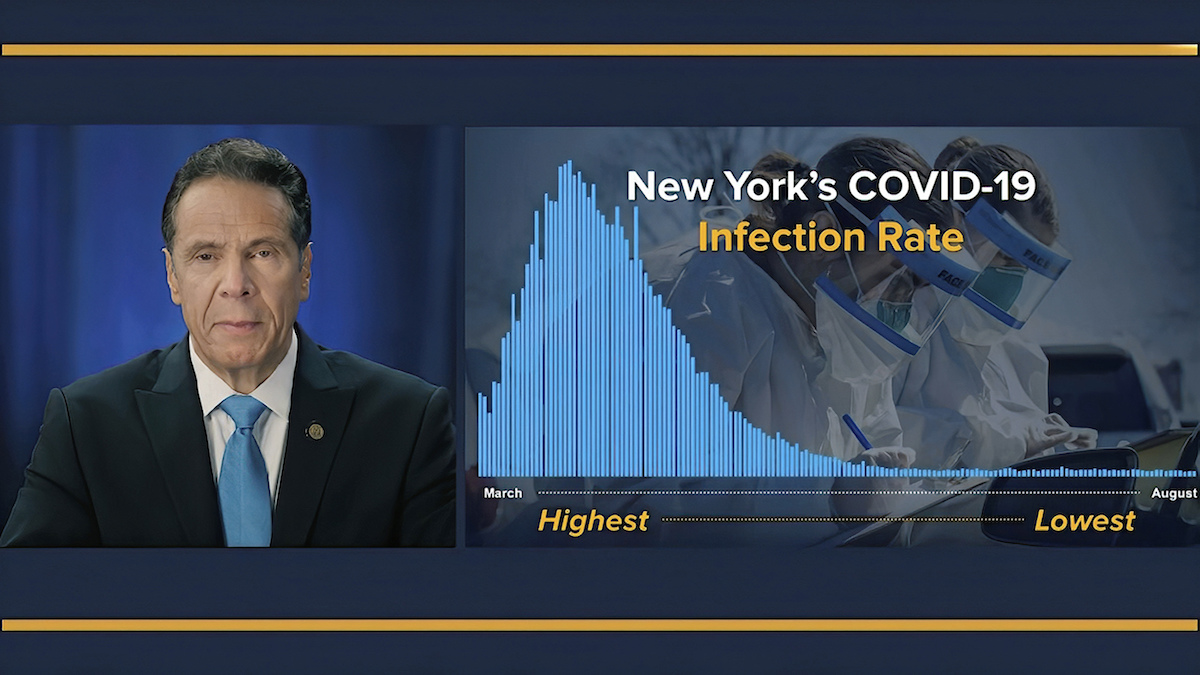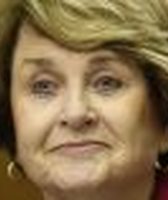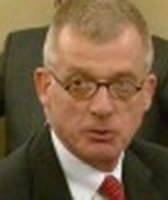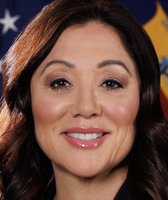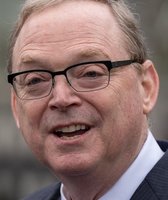Stand up for the facts!
Our only agenda is to publish the truth so you can be an informed participant in democracy.
We need your help.
I would like to contribute
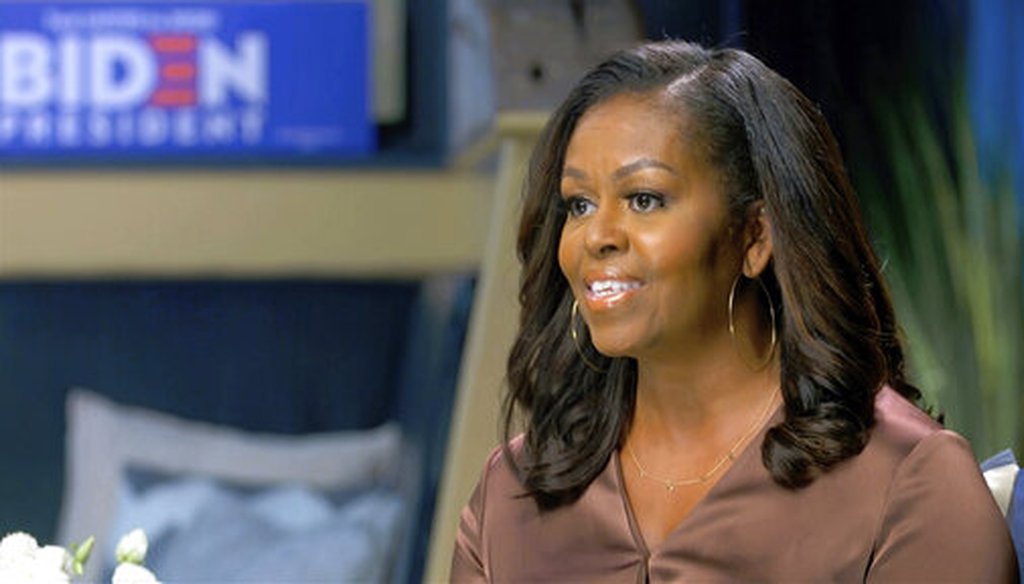
Former first lady Michelle Obama speaks during the first night of the Democratic National Convention, Aug. 17, 2020. (Democratic National Convention via AP)
Gov. Andrew Cuomo recreated a coronavirus press briefing complete with PowerPoint, Sen. Bernie Sanders spoke in front of an impressive amount of firewood, and a guy only identified as Eric from Illinois recorded a message from his phone holding what looked like a glass of whiskey.
The first night of the first-ever virtual Democratic National Convention was different.
As for the facts? Nothing jumped out as Pants on Fire false (email us if you heard differently). Some claims were in the category of interestingly accurate — like Michelle Obama’s reminder that Hillary Clinton lost the state of Michigan by just 2 votes per precinct. Others could have used more context or overstated the harm that comes from Postal Service cuts.
Here is our rundown from the DNC’s first night.
RELATED STORY: Michelle Obama didn’t mention Trump by name at 2016 DNC. In 2020 encore, she didn’t pull punches
Sign up for PolitiFact texts
"In one of the states that determined the outcome" of the 2016 presidential race, "the winning margin averaged out to just two votes per precinct — two votes." — Former first lady Michelle Obama
This is True.
In the 2016 election, Michigan — one of three crucial states that Trump flipped from the Democrats on his way to winning the White House — had 4,810 precincts. The final count in the presidential race had Trump with 2,279,543 votes in the state and Hillary Clinton with 2,268,839. That’s a margin of 10,704.
Dividing 10,704 votes by 4,810 precincts leaves 2.23 votes per precinct, on average. (Separately, third party candidates Gary Johnson, Jill Stein, and Darrell L. Castle also won more votes each than Trump’s margin over Clinton.)
— Louis Jacobson
"Social Security beneficiaries count on the post office to get their checks." — Eva Longoria Bastón, DNC host
That’s true for some beneficiaries, but not for most. We rated her claim Half True.
Around half a million people still receive paper checks in the mail. The vast majority — more than 63 million — get their payments electronically. The transition to electronic deposits started more than 10 years ago during the Obama administration to cut back on paper waste.
— Samantha Putterman
Eva Longoria, serving as moderator, speaks during the first night of the Democratic National Convention. (DNC via AP)
"Vice President Biden and President Obama assembled a pandemic playbook to make sure that America was prepared and protected. The Trump administration disbanded the pandemic response team that was given to them." — Eva Longoria Bastón
Longoria is largely correct on both points.
After the 2014 Ebola crisis, the Obama administration wrote a document titled, "Playbook for Early Response to High-Consequence Emerging Infectious Disease Threats and Biological Incidents."
The National Security Council developed the guidebook in 2016 with the goal of assisting leaders "in coordinating a complex U.S. Government response to a high-consequence emerging disease threat anywhere in the world." It outlined questions to ask, who should be asked to get the answers and what key decisions should be made.
Politico reported on the document in March, but White House press secretary Kayleigh McEnany dismissed the playbook’s usefulness when asked about it in May.
As for the pandemic response team, the Trump White House reorganized the team that oversaw global health security issues under former National Security Adviser John Bolton. Tom Bossert, a homeland security adviser who recommended strong defenses against disease and biological warfare, was pushed out by Bolton in April 2018, the Washington Post reported. In May 2018, the top White House official in charge of the U.S. response to pandemics, Rear Adm. Timothy Ziemer, left the administration and was not replaced.
Neither White House official nor their teams, which were responsible for coordinating the U.S. response to pandemic outbreaks across agencies, were replaced before the coronavirus arrived.
In November 2019, a bipartisan group of lawmakers and experts brought together by the Center for Strategic and International Studies to focus on U.S. global health security formally recommended that health security leadership on the NSC should be restored.
— Jon Greenberg
Says President Donald Trump "threatened to delay the election and suggested that he will not leave office if he loses." — Sen. Bernie Sanders, I-Vt.
Sanders has evidence to back up his claim, but Trump’s public remarks have also been confusing and contradictory.
Trump raised the possibility of delaying the election in a tweet complaining about mail-in voting, but then he said he didn’t want to delay the election.
"With Universal Mail-In Voting (not Absentee Voting, which is good), 2020 will be the most INACCURATE & FRAUDULENT Election in history. It will be a great embarrassment to the USA. Delay the Election until people can properly, securely and safely vote???" Trump tweeted July 30.
That evening when asked by reporters if he really wanted to delay the election, Trump said he didn’t want a delay, but he also didn’t want to "wait for three months and then find out that the ballots are all missing and the election doesn’t mean anything."
Trump can’t change the date of the election. Congress would have to pass a law first.
Trump has made multiple comments about staying in office beyond two terms but often indicates he is joking. Some of his remarks indicate he’s serious about at least questioning the results of the 2020 election.
In July, Fox News’ Chris Wallace asked Trump, "Are you suggesting that you might not accept the results of the election?"
Trump replied, "No. I have to see. Look, Hillary Clinton asked me the same thing."
Wallace replied that he had asked Trump the same question during a 2016 debate. When pressed by Wallace to give a direct answer as to whether he will accept the election, Trump replied: "I have to see. Look, you – I have to see. No, I’m not going to just say yes. I’m not going to say no, and I didn’t last time either."
— Amy Sherman
Sen. Catherine Cortez Masto, D-Nev., speaks during the first night of the Democratic National Convention. (DNC via AP)
"Despite what the president says, voting by mail has been a secure, proven option for decades. In 2016, 33 million Americans voted by mail. Even Donald Trump has requested an absentee ballot twice this year." — Sen. Catherine Cortez Masto, D-Nev.
Cortez Masto is correct about the extent of voting by mail in 2016 and about Trump’s own use of voting by mail in Florida this year.
Nearly one in four ballots were cast by mail during the 2016 general election, according to the U.S. Election Assistance Commission. About 140 million citizens voted using any method, which means that about 33 million cast their ballot by mail.
President Donald Trump and his wife Melania registered to vote using his Mar-A-Lago property in Palm Beach County as his address last year. County election documents show a designee who lives in Palm Beach picked up the ballots for Trump and the first lady before the March 17 presidential preference primary. Florida law allows a designee to pick up ballots for two other voters per election. The Trumps requested ballots for the Aug. 18 Florida primary, records show. They were returned to the elections office on Monday, the Sun Sentinel reported.
RELATED: Donald Trump draws false distinction between absentee, mail-in voting
Voting by mail has existed for decades. Oregon was the first state to use voting at home for all elections, when voters approved a ballot measure in 1998, according to the National Vote at Home Institute. Even before the pandemic, a handful of states conducted elections that were by mail while other states offered it as an option. Voting by mail has become a more popular option this year due to efforts by many voters to avoid infection by the novel coronavirus.
— Amy Sherman
New York Gov. Andrew Cuomo speaks from Albany, N.Y., during the first night of the Democratic National Convention. (DNC via AP)
"And our current federal government is dysfunctional and incompetent. It couldn't fight off the virus. In fact, it didn't even see it coming. The European virus infected the Northeast while the White House was still fixated on China." — New York Gov. Andrew Cuomo
There is evidence that suggests Cuomo is right. The disease most likely arrived in Europe from China, but it was travel from Europe to the United States that brought the disease to New York.
Researchers from the Icahn School of Medicine at Mount Sinai traced the strains of the COVID-19 virus, which was circulating in late January and responsible for the New York City COVID-19 outbreak, back to Europe.
The study, published in July, examined the genomic sequences of the COVID-19 virus based on samples taken from confirmed COVID-19 cases in the Mount Sinai Health System. The cases were traced through March and represented a large number of New York City neighborhoods. Only one strain was closely related to COVID-19 strains that were circulating in Asia.
"These results show that SARS-CoV-2 came to the New York City area predominantly via Europe through untracked transmissions," said Dr. Viviana Simon, professor of microbiology and infectious diseases at Mount Sinai’s Icahn School of Medicine, in a press release.
Cuomo’s charge that the Trump administration was fixated only on spread from China has some merit as well. Beginning in mid-January, the U.S. started screening travelers from Wuhan, China, where the COVID-19 outbreak started, when they entered the U.S. Then on January 31, Trump banned non-U.S. citizens from traveling from China into the United States. But U.S. citizens could still travel back from China, as long as they observed a 14-day quarantine upon their arrival. No such travel limits were put in place for Europe until mid March.
— Victoria Knight, Kaiser Health News
Says President Donald Trump "blames the prime minister of Canada for cutting him out of the Canadian version of ‘Home Alone 2.’" — Sen. Amy Klobuchar, D-Minn.
There’s some truth to this.
Trump attacked Canadian Prime Minister Justin Trudeau over a cameo of the then-businessman that was cut from the Canadian broadcast of "Home Alone 2: Lost in New York," a 1992 film about a child left alone around the holidays (again).
The scene shows protagonist Kevin McCallister, played by actor Macaulay Culkin, asking Trump for directions to the lobby of a New York City hotel.
Trump has tweeted about his brief cameo often, according to Factba.se, an interactive transcript website that tracks his public comments. On Dec. 26, 2019, Trump took aim at Trudeau over a report that the cameo was cut from broadcasts of the movie in Canada.
"I guess Justin T doesn’t much like my making him pay up on NATO or trade!" Trump tweeted.
As we reported, the Canadian Broadcasting Corporation did leave Trump’s cameo out of its 2019 rebroadcast of the film. But the edit was made in 2014 to make room for commercials, as often happens when movies move to the small screen, a CBC spokesperson said.
— Bill McCarthy
Auto workers "across our state could have lost their jobs if not for Barack Obama and Joe Biden." — Michigan Gov. Gretchen Whitmer
Whitmer praised the Obama-Biden administration for saving American auto manufacturers and the jobs they support in 2009. Her statement is accurate but needs additional context.
With General Motors and Chrysler facing imminent collapse, the Obama-Biden administration created a federal plan that required General Motors and Chrysler to file for bankruptcy and restructure their operations in order to access billions in federal support. But the Obama-Biden administration had some help first from the George W. Bush administration, which set aside $17.6 billion to provide loans to the auto industry. Experts say it gave the Obama-Biden team the time it needed to determine how best to respond.
Following the auto industry’s bailout, fewer workers were employed in the industry after the recovery from the Great Recession than before it. Federal action, however, helped place America’s auto companies on sound financial footing.
"The Bush administration is the one that actually acted to save them from an uncontrolled bankruptcy and shutdown," Aaron Bragman, the lead American automotive analyst for the financial forecasting group IHS Automotive, told PolitiFact in 2012. "The Obama administration's role was to fix them."
— Clara Hendrickson
It’s never been more important to know the facts...
2020 hasn’t turned out like any of us expected. At PolitiFact, we thought we’d be fact-checking a spirited political debate about the economy, health care and immigration ahead of voting in November.
We’re still doing that, of course, but we also find ourselves in the middle of the worst public health crisis in a century.
The coronavirus pandemic has been a call to action for all fact-checking newsrooms like ours to root out harmful hoaxes because, and we can say this with certainty, every single person in the U.S. is affected by the spread of COVID-19 and misinformation around it.
PolitiFact is not immune from the economic uncertainty that the pandemic brings. We’re doing everything in our power to expand our coverage of both COVID-19 and the 2020 election. Without a paywall, we ask readers like you to support our newsroom as we continue to provide you with the truth.
Thank you for reading PolitiFact.
Our Sources
See linked fact-checks and resources.
U.S. Election Administration, Election administration and voting survey, 2016
Vote at Home, Vote at Home: What it is, best practices, lessons learned, Spring 2020
Sun Sentinel, Mail-voting critic Trump returned mail ballot to Palm Beach County elections office — then continues assault on the practice, Aug. 17, 2020
Palm Beach County Supervisor of Elections, Voter information lookup, 2020
Florida Division of Elections, Vote by mail, Accessed Aug. 17, 2020
USA Today, President Trump requests mail-in ballot for upcoming Florida primary, despite rhetoric, Aug. 14, 2020
Email interview, Anne Wickham, Palm Beach County Supervisor of Elections executive assistant/project manager, May 21, 2020
White House Statements, Remarks by President Trump in Press Briefing, July 30, 2020
Fox News Sunday, Transcript of interview with President Donald Trump, July 19 2020
University of California–Irvine law professor Richard Hasen’s op-ed in Slate, Trump’s Jokes About Defying Election Results Could Create Chaos, Feb. 4, 2020
PolitiFact, Trump floats moving Nov. 3 election. But Congress holds that power, July 30, 2020
Email interview, Wendy Sartory Link, Palm Beach County Supervisor of Elections, Aug. 18, 2020
